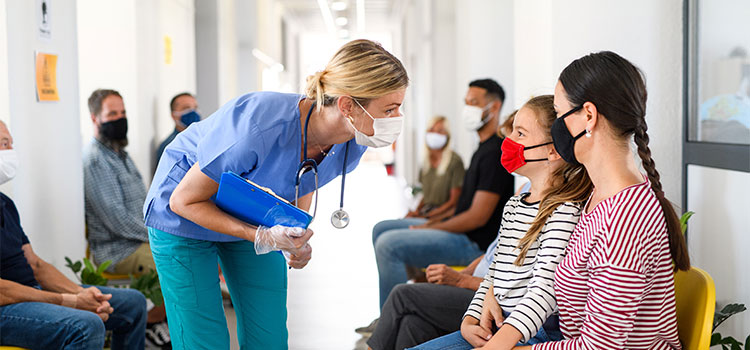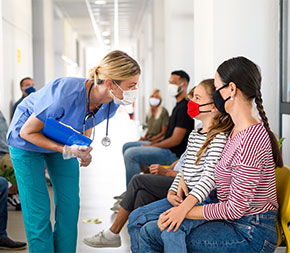Explore Related Nurse Specialties
Public Health Nurse Career and Education Guide
Public Health Nurse At a Glance
What you’ll do: Work with a population to provide outreach and education to patients.
Where you’ll work: Health departments, community organizations, nonprofits
Degree you’ll need: Bachelor of Science in Nursing (BSN)
Median annual salary: $86,070
Public health nurses are instrumental in assessing population-level health issues, designing outreach and education efforts, and helping the community at large become healthier. You must be licensed as a registered nurse (RN) to work as a public health nurse.
In this Article
Steps | Job Duties | Types of Public Health Nurses | Salary | Skills and Traits | Career Outlook | Resources
Communities rely on public health nurses more than ever, explains Julie Plagenhoef, MPH, RN, a maternal and child health consultant at the Oregon Health Authority and board member of Oregon Public Health Association and the Oregon Center for Nursing. “Especially in recent years, we’ve been advocates for health equity,” she says.
That could translate to free vision screenings, mass vaccination events, smoking cessation support groups, harm reduction practices for people who misuse substances, and countless other efforts.
How to Become a Public Health Nurse
Consider these steps as you pursue a degree as a public health nurse:
Earn your nursing degree.

“Earning your BSN is the way to go,” Plagenhoef says. Nearly every public health nursing job will require the four-year Bachelor of Science in Nursing degree, as opposed to a two-year Associate Degree in Nursing (ADN). “Do your best to take community health nursing classes in nursing school,” Plagenhoef says.
Earn your RN license.

Once you earn your nursing degree from an accredited program, you qualify to sit for the National Council Licensure Examination, or NCLEX. You must pass this standardized nursing exam, administered by the National Council of State Boards of Nursing, to become a registered nurse (RN).
Consider certification.

There is no longer a public health certification specifically for nurses, Plagenhoef explains, so you do not need a specific certification to land a job. “If you weren’t able to take specialized classes in public health nursing or community health nursing, and you don’t have any background in public health, earning a (non-nursing-specific) certification in public health can be a pathway into the career,” she says. The Certified in Public Health credential (CPH) offered by the National Board of Public Health Examiners demonstrates your mastery of public health sciences, including epidemiology and community health theory.
Get experience.

In some cases, you can go directly from nursing school into public health nursing, Plagenhoef says. More competitive jobs prefer candidates with previous experience, such as time spent working in a hospital or clinic. You can also leverage an internship or practicum spent in the public health field to demonstrate your readiness for a role you want.
Consider an advanced degree.

Not everyone needs an advanced degree to work in public health nursing. Depending on your career goals, though, you may consider earning a Master of Public Health (MPH) or Master of Science in Nursing (MSN). These graduate degrees can qualify you to advance into supervisory or managerial roles, and they may help if you want to focus on policy.
How Long Does It Take?
A BSN program typically takes four years to complete. Nursing programs include both classroom work and clinical experience.
If you go the advanced degree route, you will need more time to complete that education. An MPH typically takes two more years, though that time can be reduced if your program applies your previous studies or work experience to cover requirements.
An MSN typically takes two to three years to complete. While most people earn a bachelor’s and then a master’s in nursing, some programs have adapted coursework to accommodate RNs who do not have a four-year-degree. These programs may take longer to complete.
What Does a Public Health Nurse Do?
“The key thing about public health nurses is that they are taking care of the community across the lifespan,” says Plagenhoef. “They are population- and systems-focused, taking care of individuals as well, in all areas of physical, mental, social, and environmental health.”
A public health nurse’s responsibilities vary from job to job:
Education: Public health nurses give classes on topics such as managing hypertension; offer community education such as setting up a booth about smoking cessation at a county fair; and design public education outreach campaigns that stress the importance of childhood vaccinations, for example.
Targeted programs: Public health nurses design, plan, and run programs that focus on a certain population or health concern. This could mean offering tuberculosis testing among houseless populations or addressing reproductive health for teens.
Individual care: Nurses may directly care for patients at a public health clinic, out in the community, or in home visiting programs.
Public health care: They are involved in events that promote the health of communities, such as mass vaccinations or screenings.
Public policy: Some public health nurses may work within local, state, or federal governments to develop policies that promote public health. “These policies may be inspired by what public health nurses learn from their clients,” Plagenhoef says. “Policies address those challenges on a systems level.”
Administrative rules: Public health nurses may collaborate with a wide range of stakeholders to define how a program or policy, will be implemented. For example, the state may pass a law about providing substance abuse treatment to people who are incarcerated. Stakeholders, including public health nurses, may outline how the policy will be administered.
Public health analysis: Nurses may work with others in the public health field to “use all aspects of data collection, analysis, and epidemiologic data to assess the health of the community,” Plagenhoef says. Insights can inform policy and programs.
Does a Public Health Nurse See Patients?
The answer is often yes. Public health nurses provide care to a variety of people, and patients need to be seen for a variety of reasons. Some patients do not have private insurance and seek care at public health clinics; sometimes a public health center is the only available option in a community.
Public health nurses may also serve populations that are vulnerable, such as people who are homeless or undocumented. In some cases, public health nurses go to patients, especially when transportation is a barrier to getting care. Some patients are referred to public health nurses by their providers.
“Nurses who see patients have similarities: They work with individuals, do assessments, write individual care plans, help patients with medications, communicate with doctors or other members of a care team,” Plagenhoef says.
Public health nursing can be much different than other kinds of patient care. “In most cases, nurses work with a client and move on,” Plagenhoef explains. “As a public health nurse, you have an opportunity to work with patients on a more ongoing basis. You can work on prevention and education in a way that you don’t get to in a hospital when you see someone for a 12-hour shift and never see them again.”
Types of Public Health Nurses
The type of public health nurse you become will probably depend on where you work. “It’s about 50/50 in terms of public health nurses who focus on one specialty and those who are generalists,” Plagenhoef says.
She says that working in a small health department, community organization, or nonprofit will likely mean you’ll need to wear many hats. On any given day, you may do outreach work to prevent the spread of communicable diseases, help people sign up for social supports such as food stamps, and provide a patient with lactation support.
In other instances—particularly in larger organizations—public health nurses may specialize. Public health touches on many, many areas, including diabetes, reproductive health, maternal health, tuberculosis control, HIV/AIDS prevention, and others. In these cases, you may be able to find a specialized position where you can focus on your passion.
In some cases, public health nurses may specialize in areas such as diabetes, reproductive health, maternal health, tuberculosis control, and others.
Some public health nurses focus on a particular type of care. Some work almost exclusively by visiting patients in their homes, for example, and others may spend most of their time providing direct patient care in a clinic.
Where Do They Work?
Public health nurses can work in a variety of settings. When you are looking for a position, consider these workplace settings:
Health departments at the local, state, and federal level employ public health nurses in many roles. These are the most common workplaces for public health nurses.
Community organizations, especially those focusing on social services, may have public health nurses on staff.
Nonprofits can also employ public health nurses. These may be health-focused nonprofits, or they may employ nurses as one part of wraparound services for clients.
Job Comparison: Public Health Nurse vs Community Health Nurse
The work of public health nurses and community health nurses overlaps quite a bit. In fact, even people within the profession may use these titles interchangeably.
Public health nurses tend to focus more on the bird’s-eye view of a community’s health—whether that’s a town, county, state, or even the whole country. They may analyze statistics and data to better understand population-level health. This perspective can help public health departments identify concerns (such as disease outbreaks), design education outreach (such as a media campaign where a local sports team encourages fans to get screened for cancer), and plan interventions (such as vaccination events).
Community health nurses tend to home in on the delivery of care to individuals and families, which ladders up to a healthier community overall.
Salary
“It’s a challenging piece of public health nursing: In some areas, salary can be comparable to a nurse working in a hospital, for instance,” Plagenhoef says. That said, most public health nurses earn less than the average RN. Take a look at median annual salaries, according to the U.S. Bureau of Labor Statistics, for RNs:
“The balance is that public health nurses generally have very good benefits,” she says. As public employees, their compensation usually includes good medical and retirement benefits.
In addition, “you typically don’t have to work weekends or holidays. Having a regular schedule is a real draw for the profession,” Plagenhoef says.
Skills and Traits
“All nurses have advanced assessment and planning skills to intervene and promote physical, mental, social, and environmental wellbeing,” Plagenhoef says. “(Public health nurses) apply all those skills not only to the individual, but to the whole community and systems.” She explains that several other skills and traits are important in public health nursing.
Career Outlook
According to the BLS, demand for RNs is growing at a rate of 5.6%, which is about average for all careers. Depending on where you live—or where you are willing to relocate—demand could be greater for public health nurses, Plagenhoef says.
“We see a high demand in the field, but not necessarily because there are too few nurses in a given state,” she says. “There are a lot of nurses in hospitals, but not a lot on long-term care, home health, and public health nursing. There is a maldistribution of nurses.”
That can translate to difficulty in hiring enough public health nurses to fill all roles, particularly in rural areas and communities with a low average income. Motivated students, then, may find this is an excellent time to pursue a career in public health nursing.
In addition, some areas are rolling out or expanding public health programs in pursuit of greater health equity—programs they will need nurses to run. For example, Oregon is scaling up a program that will enable mothers of infants to receive home visits from a RN.
“That will require a large influx of public health nurses so everyone in Oregon who wants it can access it,” Plagenhoef says. “That’s definitely job security.”
Professional Resources
These resources may provide some guidance as you consider a nursing career in the field of public health:
American Public Health Association advocates for systems-level changes to improve public health and informs public policy.
The public health association in your state is a terrific resource for local issues and networking opportunities.
Centers for Disease Control and Prevention is the nationwide governmental body that provides public health guidance.


With professional insight from:
Maternal and Child Health Consultant Professor, University of Maryland School of Nursing


